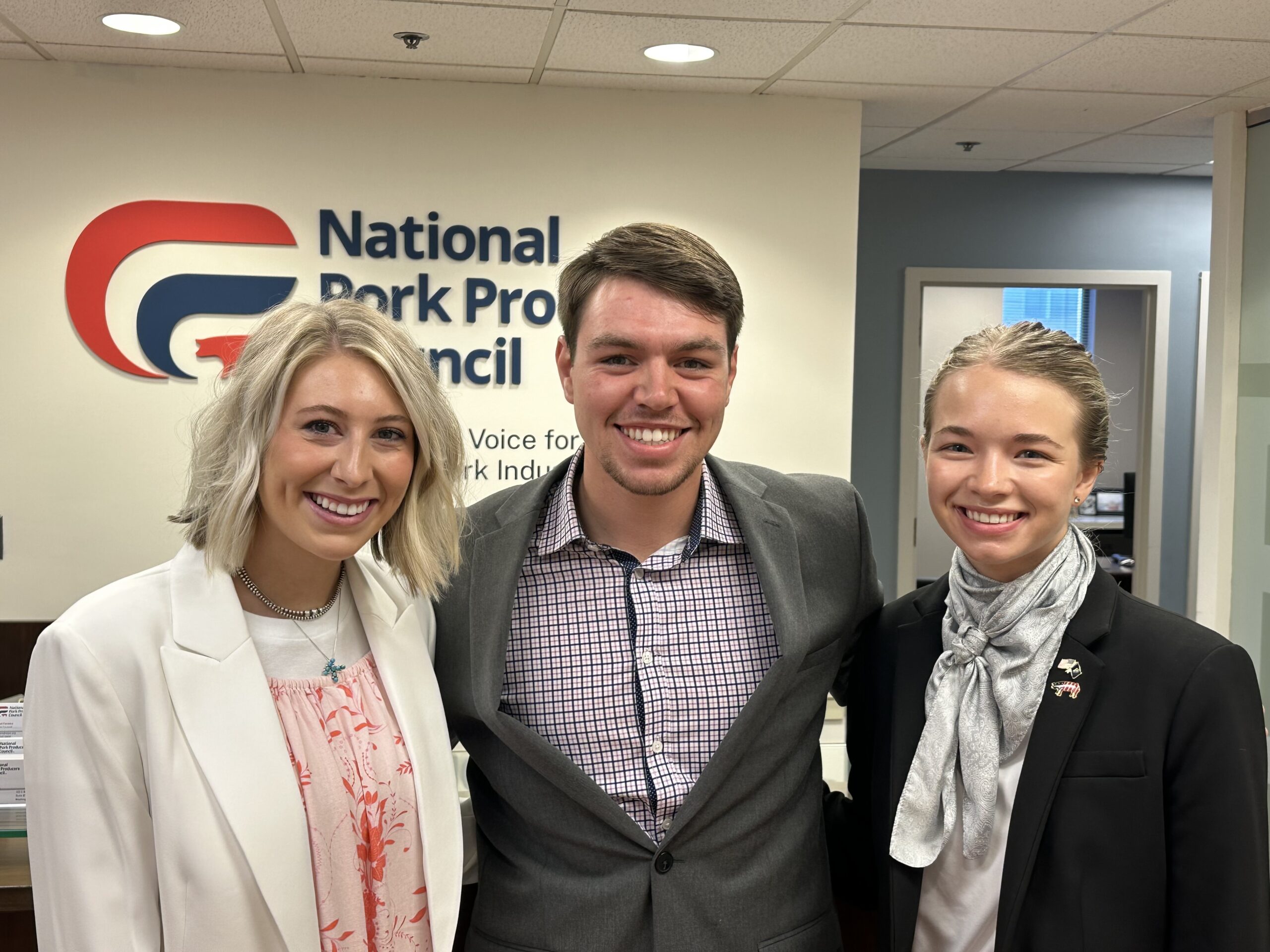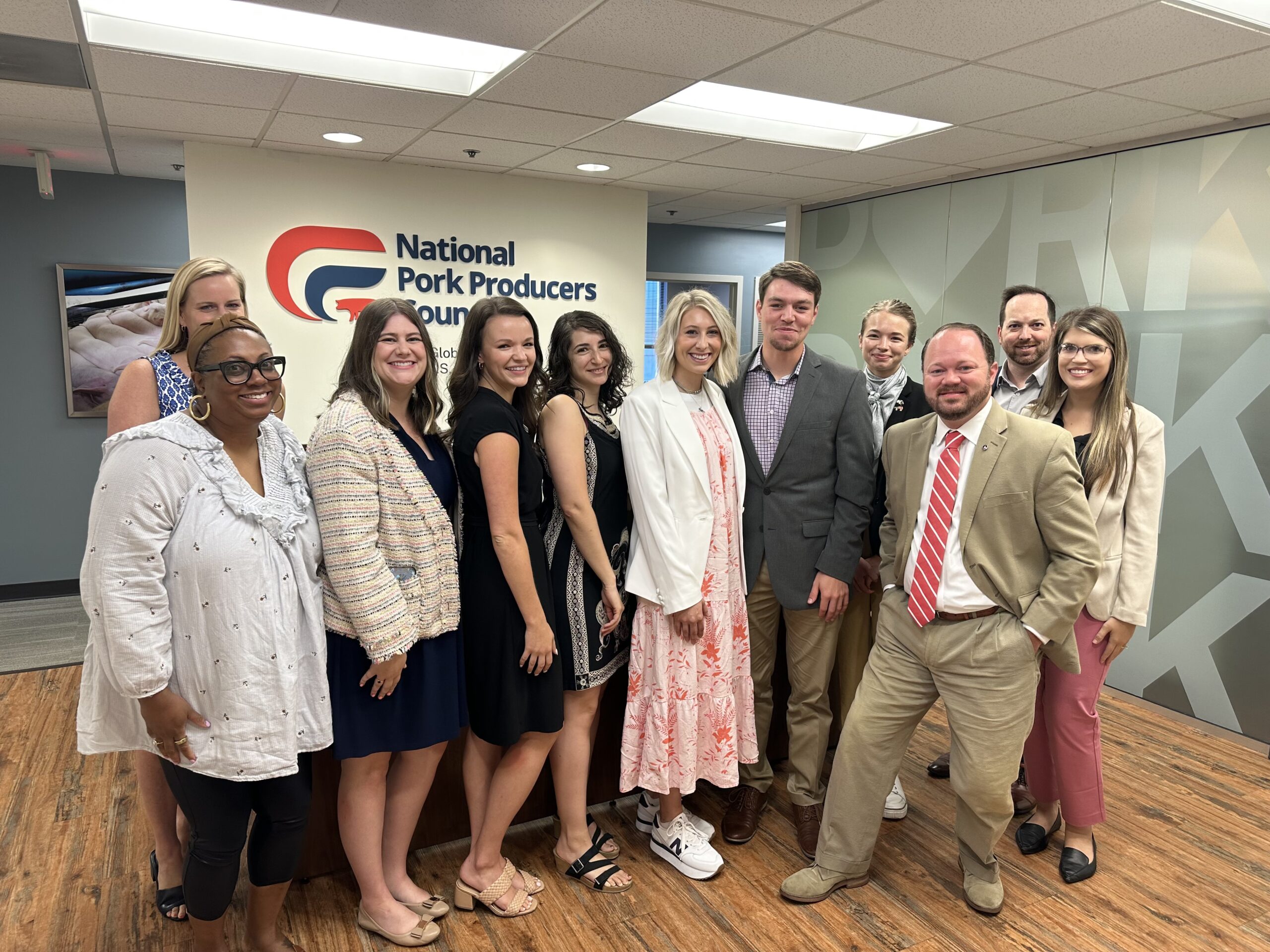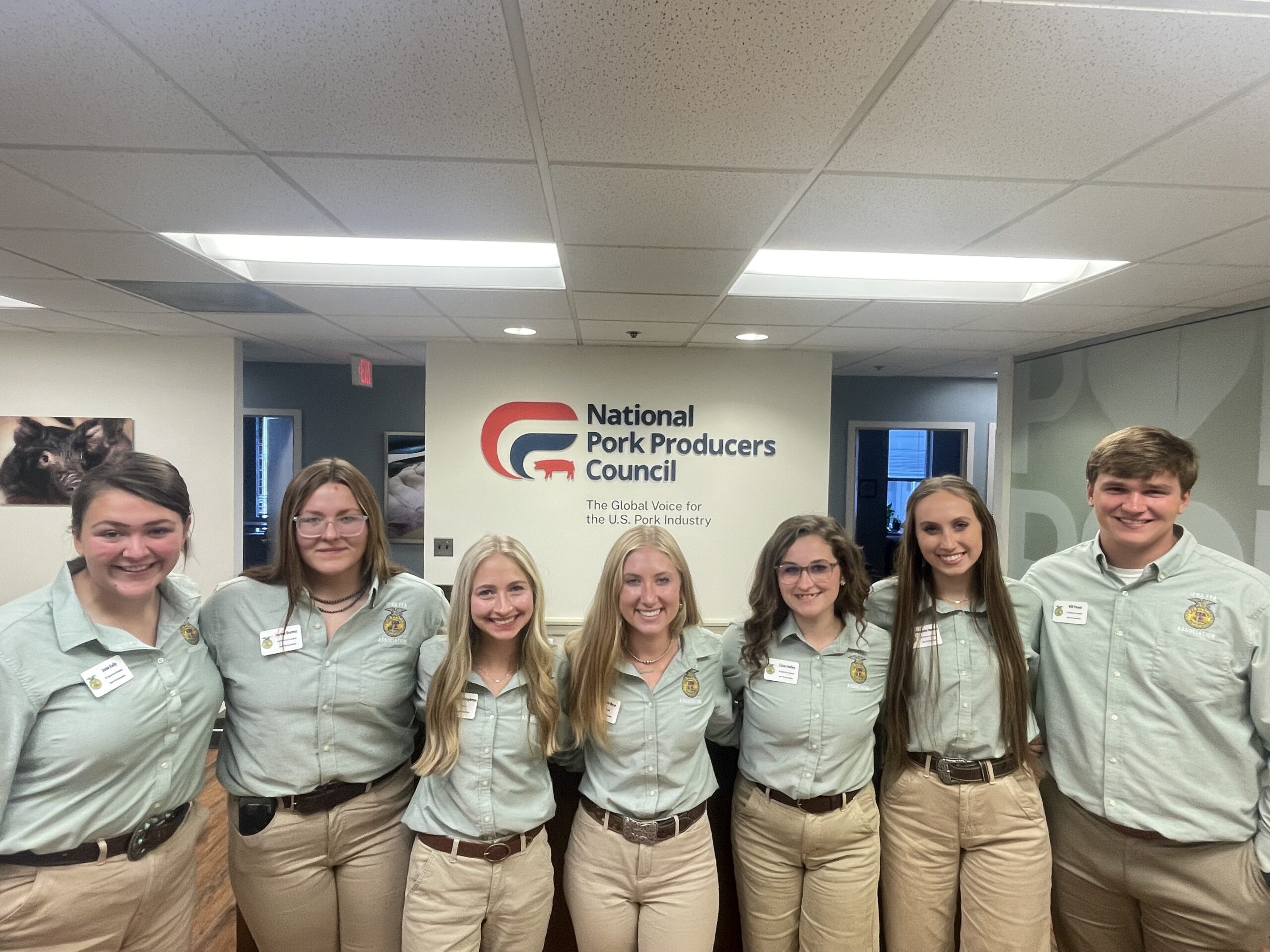Capital Update – For the Week Ending July 28, 2023
In this week’s National Pork Producers Council (NPPC) Friday recap: NPPC releases quarter three economic update, vote on House Agriculture Spending Bill delayed to September, USDA partners with state AGs to further competition scrutiny and Oklahoma Pork Council interns and Iowa FFA Association state officers visit with NPPC. Take a deeper dive below.
Capital Update to Modify Schedule as Congress Takes Break
Capital Update will be issued on an as-needed basis during the Congressional August recess. It will resume regular publication on Friday, September 8.
Economic Update Analyzes Pork Industry Issues and Dynamics
What happened: NPPC released its third quarter pork industry economic update to provide a snapshot of top pork industry issues, current trends, and marketing conditions impacting U.S. pig farmers.
Q3 takeaways include:
- California Proposition 12 creates significant challenges and market uncertainty for pig farmers across the country and has far-reaching implications beyond the pork industry.
- Persistently high production costs continue to be a major challenge to pig farmers’ profitability. Average cost and breakeven levels are 9% higher than one year ago and have increased 60% over three years.
- So far this year, negotiated hog and pork cutout values, on average, have been about 20% below the same week last year. Prices have gained seasonal momentum over the past three months but remain below year-ago levels.
- Hog slaughter and pork production increased an estimated 1.2% and 0.3% respectively through mid-July 2023. USDA is now projecting a 1.4% increase in pork production this year, while domestic pork availability is expected to drop 2.5% to 49.8 pounds per capita for 2023.
- Inflation has cooled to 3.1%, though the prices of many consumer necessities like food and housing continue to increase more rapidly than the pre-pandemic average. Inflation, rising interest rates, and other macro–level factors may continue to strain consumer purchasing power, which impacts demand for meat and pork.
What’s the word on the street: “The U.S. pork industry is incredibly important not only to agriculture but to the entire U.S. economy,” said Scott Hays, NPPC president and pork producer from Missouri. “As producers face an unprecedented economic environment caused by dynamic market conditions and exacerbated further by California Proposition 12, our industry is incredibly resilient as demonstrated by generations of farm families who continue to take pride in producing affordable, nutritious protein for consumers.”
Get quick snapshots on NPPC’s Facebook, LinkedIn and Twitter, and learn more on NPPC’s economic update dashboard.
Vote on House Agriculture Spending Bill Delayed to September
What happened: The House agriculture spending bill now won’t be considered until September, after Congress returns from a month-long summer recess. House Republicans were trying to vote this week on the fiscal 2024 appropriations legislation for Agriculture, Rural Development, Food and Drug Administration (FDA), and Related Agencies. But deep spending cuts and dozens of controversial – and non-agricultural – amendments included in it stalled action on the bill that funds the U.S. Department of Agriculture, FDA, and their programs.
The Senate is working on its own agricultural appropriations legislation that has spending levels higher than the House and none of the amendments. (House GOP members also included contentious amendments in the military construction and veterans’ affairs spending bill.)
Why it matters: The annual agriculture appropriations law funds federal programs that support farmers, including farm loans, agricultural research, and foreign animal disease (FAD) prevention. The current measure expires Sept. 30, and failure to pass a fiscal 2024 appropriations bill could lead to a partial government shutdown.
NPPC’s take: NPPC supports funding in the agriculture appropriations legislation for the National Animal Vaccine and Veterinary Countermeasures Bank, the National Animal Health Laboratory Network, National Animal Disease Preparedness and Response Program, and the National Veterinary Stockpile, which help protect livestock from FADs.
The programs provide stability for producers and veterinarians when faced with challenges from diseases such as African swine fever, classical swine fever, and foot-and-mouth disease.
USDA Partners with State AGs to Further Competition Scrutiny
What happened: The United States Department of Agriculture (USDA) launched a partnership between USDA and bipartisan state attorney generals (AGs) in 31 states and DC to “enhance competition and protect consumers in food and agricultural markets, including grocery, meat and poultry processing, and other markets.” This comes ten months after USDA announced its “Agricultural Competition Challenge” in September 2022 to “ramp up collaboration with State Attorney Generals on enforcement of competition laws.” As part of this partnership, USDA will provide additional funding and resources to state AGs for agricultural competition matters. USDA Secretary Tom Vilsack announced the partnership at the White House Competition Council’s fifth meeting.
Through the new Agricultural Competition Partnership, USDA is leveraging funds to support complex cases involving agricultural competition and jointly support research and academic work for future cases. A USDA press release indicates the Agricultural Competition Partnership will focus on: (1) anticompetitive market structures and practices, price gouging and other anti-consumer practices in food, retail, meat and poultry processing, and other agriculture industries; (2) lack of choices for consumers and producers; and (3) conflicts of interest, misuse of intellectual property, and anti-competitive barriers across the food and agriculture supply chains, such as in seed markets.
The initiative will potentially change the ability of state AGs to conduct on-the-ground assessments of competition and consumer issues, increase coordination between federal and state agriculture and competition authorities, and create new and more independent research programs.
USDA is also partnering with the Center for State Enforcement of Antitrust and Consumer Protection Laws, which provides similar support to the states. The State Center is establishing the necessary mechanisms for the AGs to cooperate with USDA. These mechanisms include an oversight committee to establish the partnership’s project governance and transparency standards and a project selection advisory committee that will review project requests and recommend approval. Both committees will be composed of participating state AG offices. Additionally, USDA has engaged with the American Antitrust Institute to be a resource for the states on this project.
Why it matters: This development is one in a long list of actions the Biden-Harris Administration has taken in an attempt to promote competition consistent with the “whole of government” approach outlined in a July 2021 executive order. USDA is also working on a series of rules under the Packers and Stockyards (P&S) Act that could have significant impacts on regulated entities in the pork industry, with two rules already proposed and a third rule expected this fall.
What’s next: The Agricultural Competition Partnership will likely direct additional scrutiny toward perceived anti-competitive actions, although there are some questions relative to the state AG’s authority to investigate under P&S. With additional resources available, the agriculture industry can expect more reports about competition, or potentially other issues, such as labor violations, that would serve as ammunition for eventual regulatory action.
NPPC takes competition issues very seriously and will continue to monitor the situation, as well as work closely with producers and NPPC’s competition committee to ensure producer voices are heard.
Oklahoma Pork Council Interns and Iowa FFA Association State Officers Visit With NPPC
What happened: This week, Oklahoma Pork Council (OPC) interns, Kate Jackson and Braden Burns, staff members, Matti Carlile, Business Coordinator, and Ashton Mese Johnston, Industry Relations Manager, and the 2023-2024 Iowa FFA Association state officer team visited with NPPC staff and subject matter experts to discuss various policy priorities, in addition to answering questions about living and working in Washington, DC.

From left to right: Kate Jackson, OPC Communications Intern, Braden Burns, OPC Outreach Intern, and Morgan Hinz, NPPC Domestic Policy Intern.
NPPC staff and Oklahoma Pork Council staff and interns.


The 2023-2024 Iowa FFA Association state officer team.